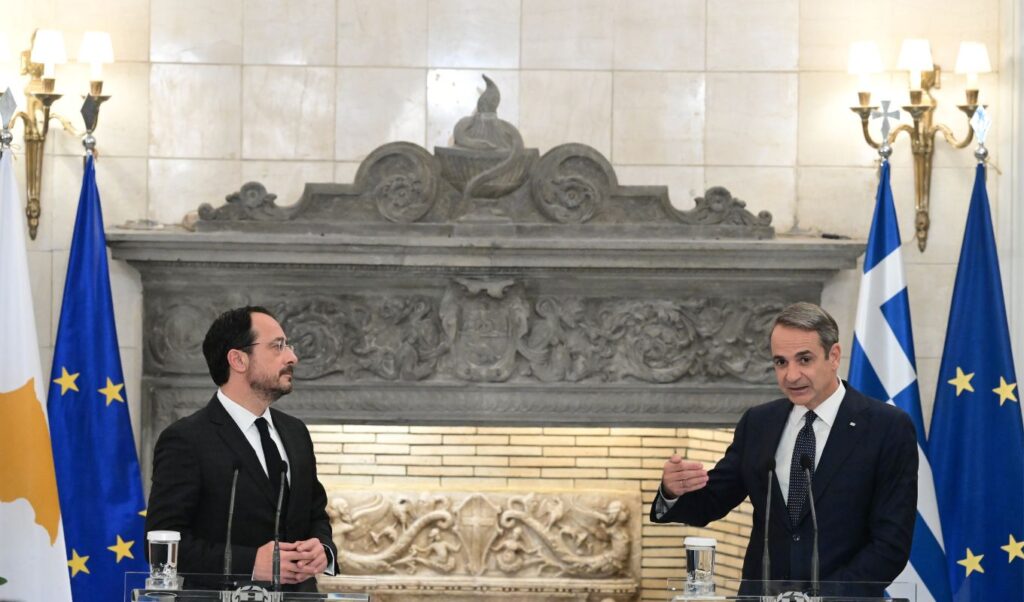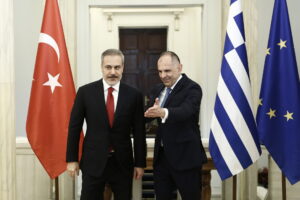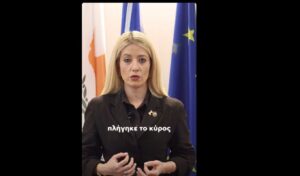The updating of technical parameters for the Greece-Cyprus interconnection project, “to be strengthened with the entry of new, powerful investors,” was announced by both sides, Kyriakos Mitsotakis and Nikos Christodoulidis today, Wednesday (12/11), from the Maximos Mansion, immediately after the completion of the 3rd Intergovernmental Cooperation Summit between Greece and Cyprus.
Kyriakos Mitsotakis referred to the 3+1 framework, saying these are significant actions for stability in our region. “All developments demonstrate the significant strategic importance of both our countries for the entire European continent, as well as the catalytic role of 3+1 frameworks which was activated again at the level of Energy Ministers in Athens,” he specifically stated and continued: “We decided to proceed with updating the technical parameters of the interconnection project between the two countries, so that it can be strengthened with the entry of new, powerful investors, which benefits all of us.”
Furthermore, Kyriakos Mitsotakis emphasized: “Athens and Nicosia remain committed to peaceful cooperation based on International Law and the Law of the Sea.” According to the prime minister, “the two countries constitute pillars of stability and reliability in the region, something confirmed by the agreements signed two days ago. At the same time, they have a strong positive sign.” “We follow Cyprus in drilling issues and a few days ago we opened a historic chapter,” the Greek prime minister also mentioned. Additionally, Mr. Mitsotakis clarified that “we want the green transition, but it would be wrong not to attempt to exploit our own resources, something Cyprus is already doing.”
Regarding the Cyprus issue, the prime minister reiterated that Greece is working for the reunification of Cyprus. Finally, Kyriakos Mitsotakis mentioned that in 1.5 months Cyprus assumes the presidency of Cyprus for the first semester of 2026. “All Greeks will stand by our Cypriot brothers. We will be by your side,” he emphasized.
Nikos Christodoulidis: Greece constitutes our most selfless ally and partner
For his part, the President of Cyprus, Nikos Christodoulidis, emphasized that the intergovernmental summit, held for the third time, has symbolic value, but also substantial, as befits Athens-Nicosia relations. “It strengthens our strategic cooperation across a wide range of issues,” he said. Reiterating Greece-Cyprus relations, the President of Cyprus mentioned that strategic cooperation is continuous, while he too announced the decision to update the economic-technical parameters for projects of strategic importance, such as the electrical interconnection project.
“The expansion of close and effective cooperation constitutes a supreme priority and was a basic component of the governmental conferences,” he noted. Furthermore, Mr. Christodoulidis mentioned that today in Greece the University of Nicosia operates, with the law for non-profit universities. At the same time, he set as areas of cooperation the environment and addressing water scarcity, an issue that is also included in the priorities of the Cypriot presidency, civil protection, protection of minors in the digital space and regarding foreign policy.
“We continue to align our actions and policies,” he mentioned, noting that there is coordination for Cyprus’s full integration into the Schengen zone. “Greece and Cyprus agreed to be in close coordination on a series of issues, also regarding the assumption of the presidency by Cyprus and Greece in 2027. Cyprus and Greece prove practically that together we achieve much more, primarily for the citizens, and this is one of our most basic goals. The focus of the effort is ending the occupation and reunifying Cyprus,” based on UN resolutions and International Law. Greece constitutes our most selfless ally and partner,” said Nikos Christodoulidis.
Joint Communique of the 3rd Intergovernmental Summit between Greece-Cyprus
On November 12, 2025, the Prime Minister of the Hellenic Republic Kyriakos Mitsotakis and the President of the Republic of Cyprus Nikos Christodoulidis co-chaired the 3rd Intergovernmental Summit of the two countries. The 3rd Intergovernmental Summit was attended by Ministers and Deputy Ministers of the two states responsible for Foreign Policy, Education, Health, Transport, Environment, Justice and crime prevention, Civil Protection, Housing Policy, Digital Policy and Technology, and Coordination of Government Work. In an environment of geopolitical upheavals, uncertainty and instability, Prime Minister Kyriakos Mitsotakis and President Nikos Christodoulidis reaffirmed the critical role of Intergovernmental Summits for further strengthening Greece-Cyprus cooperation and contributing to ensuring stability in the Eastern Mediterranean.
The framework of bilateral cooperation is broad and multi-level, covering institutional, defense, economic, energy and educational sectors. It is constantly deepening, responding to modern challenges, with results that have practical impact on citizens’ daily lives and their relationship with the state. The work of this year’s Summit was primarily concerned with the latest developments in the Cyprus issue. The two leaders reaffirmed their commitment to the common effort to restart negotiations aimed at achieving a solution for the reunification of the island based on the agreed framework of relevant UN Security Council Resolutions. They accordingly expressed the expectation that Turkey will contribute substantially to the resumption and conduct of negotiations within the agreed framework, so that there can be progress in EU-Turkish relations according to European Council conclusions. The two leaders also expressed their support for the UN Secretary-General’s efforts within the framework of the Good Offices Mission assigned to him by the UN Security Council, in view of his convening of the next informal expanded meeting. They also emphasized the particular importance of the EU taking an active role, including through the Special Envoy, within the framework of the existing UN process. The 3rd Summit focused particularly on cooperation for further improving daily life and upgrading the quality of life of citizens of both countries. In this context, it was decided in the Environment sector to jointly undertake actions to address the serious issue of water scarcity, for the management and utilization of recovered water and the transfer of know-how for large-scale desalination.
At the same time, the two countries will cooperate for the protection and resilience of critical water infrastructure, such as dams, as well as promoting responsible water use. In the Education sector, the exchange of know-how and good practices was agreed upon in critical areas such as linking education with the labor market, strengthening the importance of vocational education in both countries. The promotion of a common strategy in inclusive education was decided to ensure the right of all children to quality, equitable and inclusive education, as well as particularly strengthening children with disabilities with skills useful for their autonomy, their integration, their equal participation in social life and their professional rehabilitation. Additionally, it was agreed to strengthen Greece-Cyprus cooperation for the prevention and treatment of school violence and bullying, aiming to create safe, inclusive and supportive school environments.
In the Health sector, cooperation in Preventive Screening Programs was agreed upon. It was further agreed to sign a Memorandum of Cooperation between EODY and the Ministry of Health of the Republic of Cyprus for training health professionals in addressing antimicrobial resistance and strengthening health system resilience. In the important area of hospital operation and particularly Emergency Departments (ED), it was decided to strengthen cooperation to improve hospital operation, especially EDs, which is directly linked to the quality, safety and effectiveness of provided healthcare. In this context, electronic tracking and patient satisfaction questionnaires applied in Greece, as well as Fast Track Clinics operating in public hospital emergency departments in Cyprus, constitute basic reforms and it was agreed that they would be a field for exchanging practices between the two countries.
In the Transport sector, it was decided to undertake coordinated actions aimed at strengthening road safety. This is an issue that concerns Greece and Cyprus and is part of the EU Strategic Framework for Road Safety 2021-2030 aiming to reduce deaths and serious injuries by 50% by 2030, approaching long-term the “Vision Zero” by 2050. In the Justice and crime prevention sector, it was decided to exchange know-how in the important area of judicial reform and acceleration of justice delivery aiming to strengthen citizens’ sense of trust in the institution of justice and the rule of law. The formation of a modern and reliable mechanism for extrajudicial dispute resolution serves the broader strategic goal of strengthening the rule of law and more effective operation of Justice.
Cooperation was agreed for creating a unified front against financial crime in the broader Eastern Mediterranean region. The need for effective supervision of flows, information utilization and control at the source of violations emerges as a common priority for Greece and Cyprus. It was also agreed to strengthen Greece-Cyprus cooperation on justice and internal security issues, which is a basic prerequisite for ensuring the rule of law and effective addressing of criminal phenomena with cross-border dimensions, utilizing European tools such as the Schengen Information System (SIS) and EU information exchange mechanisms. In this context, it was decided to establish a joint cooperation group between the police authorities of the two countries, focusing on organized crime issues and effective information exchange and processing. The common path of Greece and Cyprus in the field of justice and security substantially contributes to strengthening European security and justice policy. Additionally, cooperation between Greece and Cyprus was agreed on the major issue of Housing Policy, with common technical specifications, pilot actions in tension zones and coordinated presence at EU level for strengthening social and affordable housing, which constitutes a basic right of citizens and obligation of the State. In this context, it was decided to exchange good practices and know-how, based also on the flagship Programs “My Home” and “My Home 2”.
In the crucial area of natural disaster risk assessment, cooperation was agreed through the use of new digital tools for natural disaster risk assessment that allow early recognition, prediction and mapping of risks from phenomena such as fires, floods, earthquakes or extreme weather events. It was agreed to transfer know-how and good practices utilizing the experience and methodology developed in Greece for designing the National Forest Fire Risk Assessment Map, as well as the National Database, through which for the first time, a unified digital center of knowledge and action is created, where all involved bodies connect to a common information environment, exchanging critical data in real time, also using artificial intelligence, with predictive models that forecast fires, floods or earthquakes, providing early signals for preventive interventions. Additionally, the establishment of the European aerial firefighting center based in Cyprus (Cyprus Regional Aerial Firefighting Station/CRAFS) was discussed, which will operate as the EU’s Eastern Regional Aerial Firefighting Center, and bilateral cooperation was agreed for exchanging know-how in managing aerial firefighting operations, fleet management, operational planning and international cooperation within the framework of the EU Civil Protection Mechanism and rescEU. The importance of the New Pact for the Mediterranean, adopted by the European Commission in October 2025, was additionally emphasized as the basic framework for strengthening cooperation between the European Union and Southern Neighborhood countries. Greece and Cyprus agreed to cooperate closely for its implementation, especially in view of the Cypriot Presidency of the EU Council in the first semester of 2026, during which the Pact’s implementation will begin and the Action Plan will be presented, as well as in view of the Greek Presidency in the second semester of 2027, aiming to continue and deepen related initiatives. In this context, joint actions and projects of common interest will be promoted, utilizing and expanding their existing cooperations with the Southern Neighborhood.
With citizen protection in mind, new actions were decided for jointly addressing and highlighting domestic violence and violence against minors, supporting and empowering victims and actively promoting equality in all areas of daily life. These issues constitute a strategic priority for both countries through a comprehensive framework of policy interventions and actions. Cooperation was agreed for implementing relevant policies utilizing technology and private sector cooperation. Furthermore, cooperation in the field of Digital Policy and Technology was decided. This theme acquires particular importance in view of the Cypriot EU Presidency in 2026 and the Greek Presidency in 2027, as it provides an opportunity to formulate common European positions on issues such as Artificial Intelligence and implementation of the AI Act, protection of minors and digital well-being.
It was decided to deepen Greece-Cyprus cooperation in public digital policy, innovation, and cybersecurity that strengthens the role of both countries as digital hubs of the Eastern Mediterranean, while promoting joint participation in high-technology European initiatives. Aiming to address common challenges and the need for rapid adoption of digital services to ensure cybersecurity and protect citizens from digital age risks, cooperation was agreed for highlighting digital age verification and parental control tools, such as Kids Wallet, as pan-European standards for minor protection. It was agreed that Cyprus will participate in the interstate AI Gigafactories initiative jointly with Greece, as a reference point for Digital Europe in the Mediterranean, as well as deepening cooperation between the two countries in cybersecurity and public service interoperability, aiming to create a unified Mediterranean digital governance ecosystem. Also, cooperation in Space Technology and programs was agreed through the upcoming signing of two Cooperation Memoranda by the relevant Ministries.
In the legislation field, undertaking joint initiatives for implementing good legislation principles, utilizing digital law preparation tools and promoting modern impact analysis and law codification methodologies was discussed. This is cooperation that contributes to forming a stable and transparent regulatory environment, capable of supporting legislative effectiveness. Additionally, issues that will concern the upcoming Cyprus Presidency of the EU Council in the first semester of 2026 were discussed. Greece and Cyprus agreed in view of the Cypriot Presidency but also with the horizon of the Greek Presidency of the EU Council in the second semester of 2027, to be in consultation and communication on a series of issues that concern them within the EU framework. In view also of Cyprus’s full integration into the Schengen area, Greece will represent Cyprus in the field of issuing Schengen visas in 19 third countries. In this context, the Foreign Ministers of both countries signed a Joint Declaration. The two countries discussed the issue of EU enlargement and expressed the common conviction that enlargement, always based on existing intergovernmental procedures and agreed conditionality, constitutes an investment for Europe’s security and stability. Greece and Cyprus emphasized their commitment to contribute as strong security pillars to regional stability and that they remain unwavering in promoting peaceful cooperation and good neighborly relations, with respect for International Law and the Law of the Sea.
The next steps for deepening existing trilateral cooperation schemes in the Eastern Mediterranean were examined, such as through the recent meeting of the 3 + 1 formation for promoting critical economic and energy interconnection projects for prosperity. Ways of cooperation between Greece and Cyprus in implementing development cooperation programs and providing humanitarian aid to third countries were also discussed, with joint actions by Hellenic Aid and CyprusAid in priority countries of both countries. Finally, it was agreed that the next Intergovernmental Summit will take




